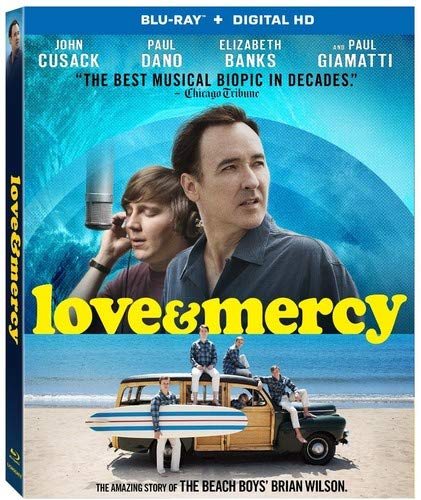
Written by Kristen Lopez
There’s an uncategorized subgenre in the biopic world – geniuses struggling through mental illness. It’s been well documented that the smartest people in the world were often marred, and aided, by their “madness.” Brian Wilson of The Beach Boys was one such genius desperate to recreate the symphony in his head and turning out an album considered one of the best ever made, Pet Sounds. Director Bill Pohlad presents that with Love & Mercy, the story of Wilson’s return from the brink, particularly after the Beach Boys broke up. Not breaking any new ground narratively, Love & Mercy is a must-see for the trio of actors (Paul Dano, John Cusack, and Elizabeth Banks) creating their finest work.
In the 1960s Brian Wilson (Dano), Beach Boys member and songwriter, was a lyrical genius despite suffering from auditory hallucinations. By the 1980s, Wilson (Cusack) has become a shell of his former self, controlled by Dr. Eugene Landy (Paul Giamatti). When Wilson meets Melinda (Banks), the two’s blossoming romance helps resurrect Wilson.
It’s hard reducing Love & Mercy to a brief synopsis since everything plays out rather formulaically. Wilson has suffered mental illness for years yet finds redemption and romance with a kind woman, while simultaneously trying to extricate himself from the claws of a manipulative jailer. This isn’t the fault of screenwriters Oren Moverman and Michael Lerner; in fact, much of the dialogue is well-done. It’s just hard shaking off the Behind the Music feel the film has, and that’s because Wilson’s life was ripe for it.
Much of Wilson’s life isn’t included, but what’s there presents a compelling story about the struggles of fame and a desire to create something enduring. During the Beach Boys period Dano’s Wilson wants to create a noise sound, one filled with non-diagetic sound. He appreciates music, as well as the unsung studio musicians who created it. Much of Dano’s dialogue and interactions were improvised, and it’s amazing watching how music is often created by studio musicians trying to recreate the sound the composer hears in their head, whether it’s the way a guitar string is plucked or the way a drum is beat.
All of this depicts the portrait of a man who refused to let his troubles affect his brilliance. Dano and Cusack each play Wilson in their own way, but both retain his vulnerability and humility. Confronted with the money and material gain stemming from Wilson’s name, each actor presents the character’s shying away from trading in on his fame.
Since events happen after the heady rush of initial fame, Dano’s character is given the role of a 1960s Da Vinci hunting for his Mona Lisa. Dano’s performance bears its own luminosity as he hunts for ways of conveying and matching the sounds in his head; “Well, it works in my head.” Whether he’s playing a piano riff that segues into the creation of “Good Vibrations,” or trying to tell the band about the litany of ideas he’s working with while in a swimming pool, Dano never plays the role of a stereotypical mad genius.
An awkward meeting while sitting in a Cadillac propels the romance between Cusack’s Wilson and Banks’ Melinda, and from there the audience watches the story through Melinda’s eyes as the man she’s grown to love goes from delightfully quirky to a prisoner sucked dry of his money and talent.
Dano’s performance captivates, but it is truly Cusack and Banks whose work cements Love & Mercy’s tone. Dano’s sequences are great, but because Cusack hasn’t gripped me with a performance of his in so long, I found myself drawn towards his moments more; this could also be becuase much of the film’s conflict stems from Wilson’s skewed relationship with Landy. Cusack’s performance is quiet, subtle. His attempts to describe his upbringing at the hands of an abusive father conveys both the damage he’s suffering as well as his resilence. He never feels pity for himself or his situation, nor does he expect others to pity him.
For her part, Banks takes the lead for much of the film’s second half. Melinda isn’t the savior, but the script certainly presents her as the catalyst, taking charge to give Brian his life back. Banks, too often mired as the supportive wife or source of comedy, shines in several key dramatic moments, particularly reacting to Brian’s horrific care by Landy. Her reaction towards hearing Brian describe his father’s abuse or Landy’s outburst over Brian eating a hamburger, mimic the audience’s. Coming up against Giamatti’s Landy, Banks refuses to back down, presenting a strong, stable front that’s impressive to watch. Hopefully Banks, as well as Cusack, get some recognition come awards time.
Somewhat light on bonus content, Love & Mercy’s Blu-ray contains some great content those seeking more information will enjoy – director Bill Pohlad provides commentary, there’s two featurettes, deleted scenes, and a digital download code included.
Love & Mercy isn’t as hard hitting or affecting as this year’s other 1990s set music biopic, Straight Outta Compton, but Cusack, Banks and Dano are fantastic and deserve all the praise there is. Eschewing condescension or inspiration for a simple tale of getting back up on one’s feet, Love & Mercy delivers plenty of both.